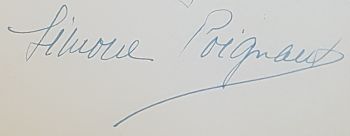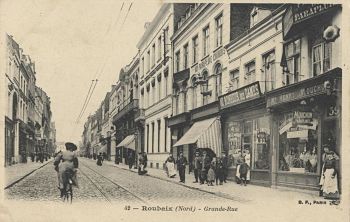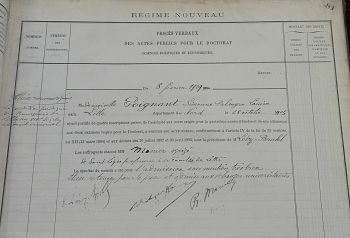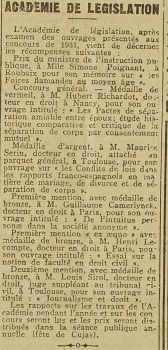

Childhood and secondary education
Simone[1] Poignant was born in Lille on 28 October 1905. She was the only daughter of Jules Poignant, a café owner at the time, and Gabrielle Bodelle, a dressmaker. At the time, her parents lived in Lille, at 75 rue Pierre Legrand in the Fives district.
Jules Poignant was originally from Waben (Pas-de-Calais). After working as a domestic servant in Paris, he moved to Lille, where he worked as a brakeman[2],which was his profession at the time of his marriage in 1900. He probably owed his job in the railway business to his older brother Charles, a stationmaster. Jules Poignant and Gabrielle Bodelle, his future wife, were neighbours. Gabrielle Bodelle grew up and lived at 12 boulevard de l’Usine until her marriage. Her father, Pierre Bodelle, a railroad mechanic, died when she was 12. She was raised by her mother in this working-class neighbourhood, with life dictated by the rhythm of the comings and goings of the Compagnie de Fives-Lille workshops.
Around 1903, Jules Poignant suffered an accident that left him with an amputated right leg. It is likely that he then obtained an annuity enabling him to acquire the business he owned at the time of his daughter Simone’s birth.
In 1910, the Poignant-Bodelle couple, living in Mons-en-Baroeul, bought a business selling groceries, preserves, eggs, butter, cheese and milk on rue Carnot in Berck-Plage.
At the time of the 1911 population census, the whole family and a servant, Léonie Couplet[3],lived on this shopping street in Berck-Plage, where Jules worked as a creamer.
Simone Poignant grew up in the seaside town of Berck-Plage and probably attended the local girls’ school. It is difficult to know where she continued her studies: Montreuil-sur-Mer elementary school, Boulogne-sur-Mer girls’ college, perhaps?
However, Simone Poignant is confirmed as having completed her secondary education at the Lycée Fénelon in Lille in 1923. The previous year, her parents bought an umbrella and cane shop at 39 Grande-Rue in Roubaix, where the whole family settled, as Simone Poignant’s student record later shows.
Studies at the Faculty of Law: between thesis and legal history research
In the autumn of 1923, Simone Poignant enrolled at the Lille Faculty of Law. In July 1924 and 1925, she successfully passed the first and second Law Baccalauréat examinations. Following this initial diploma, she went on to study for a bachelor’s degree in law, graduating in July 1926. She continued her studies, obtaining a postgraduate degree in ‘Roman Law - History of Law and Private Law’ in 1927. A brilliant student, she was awarded honours for each of her degrees. She completed her studies on 8 February 1929 with the defence of her thesis entitled TheLegal Status of the Bourgeoisie of Lille in 14th-Century Criminal Law.She became the first woman to earn a doctorate in political science and economics from Lille’s Faculty of Law. Her thesis was not only awarded first class honours, but also the Prix de thèse de doctorat awarded by the Amis de l’Université de Lille.
The thesis jury, made up of Henri Lévy-Bruhl, Professor of Law and Chairman of the jury, Raymond Monier, ‘agrégé’ in law, and Alexandre de Saint-Léger, Professor at the Faculty of Arts, appreciated and congratulated Simone Poignant’s doctoral contribution to knowledge on the subject, as well as the important palaeography and source analysis work she had carried out.
The following year, Simone Poignant continued her research into the history of law with a study entitled The Lille Fair. Acontribution to the study of Flemish fairs in the Middle Ages.Awarded national recognition, this study won the gold medal at the Concours Général de Doctorat and the grande médaille d’or, the Prize of the Minister for Public Education, from the Toulouse Academy of Legislation in 1931.
Leaving the Nord region
After winningher prizes, Simone Poignant disappeared from the news[4].She likely gave up university research in law and left the Nord region. Years later, in 1953, we tracked her down in Paris. She lived at 3 square de Tocqueville in the 17th arrondissement. Her mother, Gabrielle Bodelle, died at the same address on 29 January 1949. It is possible that her widowed mother joined her daughter in Paris.
At the time, Simone Poignant was Chairwoman of the Comité de Défense des Importateurs de Pâtes à Papiers (Paper Pulp Importers’ Defence Committee). These roles enabled her to join the corps of French foreign trade advisors between 1953 and 1963. On the Comité national des conseillers du commerce extérieur de la France (National Committee of French Foreign Trade Advisors), she was a member of the transport and paper industries commissions, as well as the 15th regional committee (Paris-Seine).
Simone Poignant’s academic research was still authoritative when she died in Nice on 9 May 1987.
Notes written by Marjorie Desbordes and Nathalie Barré-Lemaire.
Notes
[1] Although her first name is spelled ‘Simonne’ on her birth certificate and other official documents, she adopted the custom of writing it ‘Simone’ and her signature uses this spelling. That’s why this biography respects this choice and uses the spelling ‘Simone’.
[2] A brakeman is a railway worker whose job is to apply the train brakes under the orders of the locomotive engineer.
[3] Léonie Couplet, who was 15 years old in 1911, came from the same village as Jules Poignant: Waben.
[4] However, it was possible to find two references to a Simone Poignant, without ever being able to establish whether it was her or a namesake. In 1934, a Simone Poignant presented/proposed a legal segment to Radio Fécamp. In 1971, a Simone Poignant was awarded the Prix Albéric Rocheron by the Académie Française for her book Les Filles de Louis XV. L’ailedes Princes. This same person was most certainly the author of the 1966 book L’Abbayede Fontevrault et les filles de Louis XV.
Sources
Nord Department Archives
Lille Faculty of Law student file - 2633W207.
Registers of graduates from the Lille Faculty of Law - 6T69.
gallica.bnf.fr/National Library of France
Digitised press and magazines: Le Grand Écho du Nord de la France, La Croix, La Dépêche, L’Ouest-Éclair, Recueil de l'Académie de législation founded in Toulouse, Revuehistorique.
bn-r.fr / Bn-R - Roubaix Digital Library
Digitised postcard: Roubaix’s Grande-Rue in 1911, CP_A06_L1_S1_A_003.



